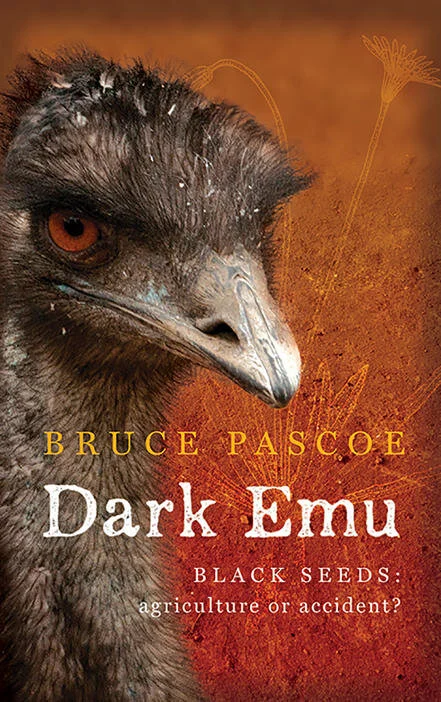UPDATE : Join the Petition & Write an Email to the University of Melbourne
Our State Library of Australia triumphantly carries on its website details of Bruce Pascoe’s win.
Dark Emu
Bruce Pascoe
NSW PREMIER’S LITERARY AWARDS INDIGENOUS WRITER’S PRIZE
2016 - WINNER
Judges' comments
This vital book wrestles with Australia’s ideas about itself and its oldest traditions. Dark Emu injects a profound authenticity into the conversation about how we Australians understand our continent. Pascoe demonstrates with convincing evidence, often from early explorers’ journals, that the Aboriginal peoples lived settled and sophisticated lives here for millennia before Cook. Aboriginal democracy created ‘the Great Australian Peace’ on a continent which was extensively farmed, skilfully managed and deeply loved. The British colonist Cecil Rhodes outlawed any mention of Shona architectural achievement in Zimbabwe; Pascoe argues convincingly that a similar intellectual ‘disappearing’ of Aboriginal civilisations has taken place here. Dark Emu reveals enormous Aboriginal achievement in governance and agriculture, and restores these to their rightful place at the epicentre of Australian history.
Pascoe’s thesis is not simply about what once was but, critically, it also informs a vision of an Australia yet to be. ‘Ensuring that Aboriginal life and history are not wiped from the map because they interrupt the view from Parliament House,’ he argues, ‘will have a convulsive effect on the country’s prospects.’ Passionately and with great love, Pascoe builds a picture of a shared future in Australia based on the traditions which sustained the Aboriginal Nations for so long: respectful human co-operation across political borders, and knowledgeable, sustainable care of the natural world. A voice at once catalysing and unifying, Bruce Pascoe is without peer in his field. Dark Emu is essential reading for anyone who wants to understand what Australia once was, or what it might yet be if we heed the lessons of long and sophisticated human occupation.
-Updated on 22 May 2020
[and oh.. just to rub our noses in how far modern Australia has come in destroying the meaning of the word, ‘literature’, we note that the State Library of NSW is situated at, 1 Shakespeare Place, Sydney NSW 2000 Australia - Editor]
Bruce Pascoe being presented with the Australia Council Award for Lifetime Achievement in Literature in March 2018. Bruce is an award-winning Yuin, Bunurong and Tasmanian author. (Source)
And thank God the Australia Council for the Arts has a comprehensive 186 page document looking out for the interests of Indigenous Australians (here). It makes us proud to be a modern Australian (not).
The Australia Council for the Arts tells us that,
‘In March 2018, Bruce Pascoe was presented with the Australia Council Award for Lifetime Achievement in Literature. Bruce is an award-winning Yuin, Bunurong and Tasmanian author who has written over thirty books spanning fiction, non-fiction and children’s titles. The Australia Council has long supported Bruce’s work, which is helping a national and international audience understand the strength of Aboriginal culture and knowledge, and its centrality to Australia’s history.
Bruce Pascoe’s award winning non-fiction book Dark Emu, published in 2014, is a monumental work of scholarship that disproved the long-held myth that Aboriginal and Torres Strait Islander peoples were nomadic hunter gatherers before European colonisation…
Dark Emu was published by Magabala Books, based in Broome, which the Council supports through Four Year Funding…First Nations-owned Magabala Books…has a national and international reputation for the quality of its titles and for nurturing First Nations artists, authors, illustrators and storytellers to bring their stories to publication…’
Australia Council for the Arts website
‘Uncle Bruce Pascoe gave the audience a good giggle when he admitted he was wearing his first-ever owned suit, as he accepted the major award at the Indigenous community's night-of-nights.’ (Source)
Sophie Verass of SBS’s NITV tells us in November 2018 that,
‘It was a big night for Bunurong author, Uncle Bruce Pascoe on Friday. The Dark Emu (a critically acclaimed non-fiction work about Indigenous agriculture) novelist went home with the prestigious Person of the Year award at the National Dreamtime Awards— and did so wearing his first owned suit.’
We have collated here, using information from the public domain, a list of estimated Income, Awards, Grants, and Funding received by Indigenous Professor Bruce Pascoe, one of Australia’s most successful Aboriginal men, who has carved a very successful career for himself as an Aboriginal writer and Indigenous farmer - truly an inspiration to other Indigenous Australians
Note 1: This list has been compiled in good faith from publicly available sources of information. Any errors are entirely unintentional and readers are encouraged to advise us at, dark.emu.exposed@gmail.com , of any errors or corrections they may find.










